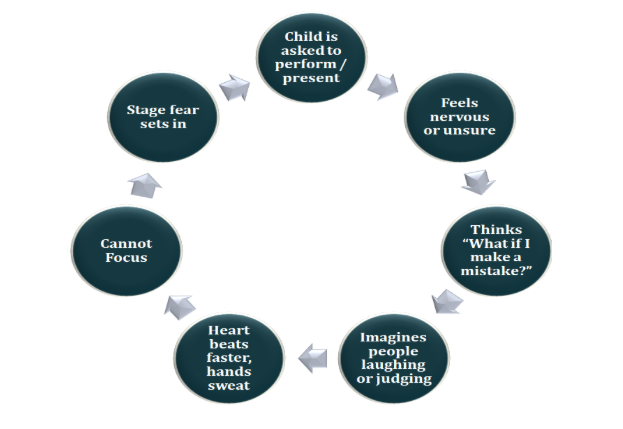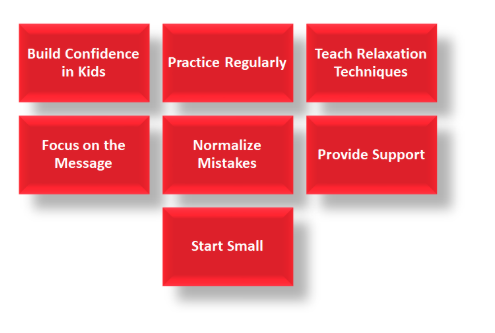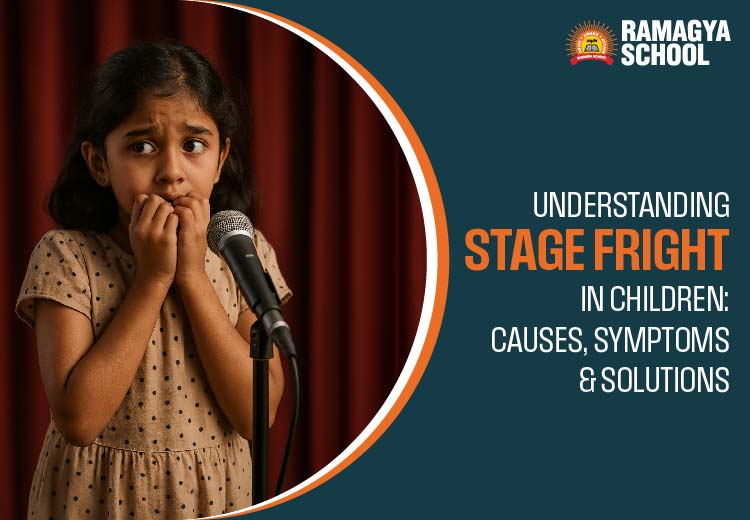Stage fright is very common in children. It happens when kids feel nervous or scared about performing in front of people. Some kids enjoy being on stage, but others get really anxious and shy. Understanding why it happens, noticing the signs, and helping your child deal with stage fear can make them more confident and comfortable.
What is Stage Fright?
When a child is nervous or afraid before or during an event, it’s called stage fright. This fear can affect their mind and body, and stop them from performing at their best.

Why do Children have Stage Fright?
There are several things that can cause stage fright in children:
- Lack of Practice: Children with little or no experience may feel uncertain or afraid.
- Be worried about Judgement: Children may be afraid of being criticized or laughed at.
- Perfectionism: Some children want everything to be perfect. They fear making mistakes.
- Parental Pressure: Parents who expect too much from their children may cause anxiety.
- Previous Bad Experiences: If your child has had a poor performance in the past, they might feel afraid next time.
Signs Your Child Has Stage Fright
Children with stage fright might show these signs:
- Shaking the hands or legs
- Dry Mouth or Throat
- Fast heartbeat
- Sweating
- Feeling sick or having stomach aches
- Avoiding eye Contact
- No desire to perform
Identifying early warning signs can help you better support your child.
How to Help Your Child Overcome Stage Fear

- Build Confidence in Kids
Encourage your child to first perform for family and friends. Give them credit for their little efforts and accomplishments. It makes them prouder and less afraid.
- Practice Regularly
Children become more confident when they practice regularly. You can record them or let them practice in front of the mirror to track their progress.
- Teach Relaxation Techniques
Before going on stage, teach your child to relax, take deep breaths or imagine positive outcomes. This will calm their nerves.
- Focus on the Message
Your child will learn that it is not about being perfect, but rather sharing their talents or messages. Reduce anxiety by focusing on the child’s message, not worrying about the audience.
- Normalize Mistakes
Small mistakes don’t really matter. Assure them that the majority of people will not notice minor errors.
- Provide Support
If possible, be present during performances or practice. Children feel safer when they know a trusted adult will be nearby.
- Start Small
Start with smaller audiences and increase them gradually. It will help children become more comfortable with performing.
Ramagya School: Top school in Noida
Ramagya School is one of the top schools in Noida that focus on child development. The school offers a supportive and safe environment for children to try out new activities and gain confidence.
Students have many opportunities to express themselves and perform with the help of experienced teachers. Ramagya School prepares children to be confident in their ability to handle challenges, both academically and emotionally. Here, kids perform on stage confidently under the guidance of our experienced and kind teachers who make them feel comfortable and confident.
FAQs
Q1: Is stage fright normal for children?
Yes, it is very common. With the right help, most children can manage their anxiety.
Q2: How can I help my child practice?
Make practice fun and safe at home. Start with small audiences like family and friends.
Q3: Should I force my child to perform if they are scared?
No. Encourage them gently but respect their comfort level.
Q4: Can stage fear affect my child’s performance?
Yes, but with practice and support, they can overcome it and perform confidently.
Q5: Are there experts to help with stage fear?
Yes, counselors, coaches, and speech therapists can give extra support if needed.




